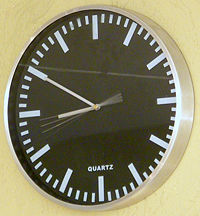Difference between revisions of "Wall clock PPM"
| Line 6: | Line 6: | ||
The solution was simple but brilliant (in all modesty). | The solution was simple but brilliant (in all modesty). | ||
| − | |||
| − | |||
[[Image:PPM_Wall_clock.jpg|200px|thumb|right|Test subject - doing time-warp]] | [[Image:PPM_Wall_clock.jpg|200px|thumb|right|Test subject - doing time-warp]] | ||
| + | As a time reference, the clock on National Television channel DR1's [http://en.wikipedia.org/wiki/Teletext Teletext]. The accuracy of this clock is not known to me, but it is most likely sync'ed to [http://en.wikipedia.org/wiki/DCF77 DCF77] or similar. | ||
| + | The time of sample was done by reading the clock at at certain time based on the time on the TV. The delay of up to 1 sec. still exsists, but I now have a "stop-watch" that can run for so long, that the 1sec is a very low factor in the overall result. | ||
Revision as of 20:12, 29 March 2010
PPM - A Layman approach to accurate measurements
The wall clock had been running too fast for a long time, about 10min, I wondered how much. Well I could use a stop-watch and count how long it takes to count 60sec. The problem with this is that the uncertainty of my reaction speed would have a significant impact on the result. Say I can react within 1 sec, that is also the resolution on the watch, the potential error is 1/60, or 16667PPM!! (OMG,BBQ,WTF and so on and so forth).
The solution was simple but brilliant (in all modesty).
As a time reference, the clock on National Television channel DR1's Teletext. The accuracy of this clock is not known to me, but it is most likely sync'ed to DCF77 or similar. The time of sample was done by reading the clock at at certain time based on the time on the TV. The delay of up to 1 sec. still exsists, but I now have a "stop-watch" that can run for so long, that the 1sec is a very low factor in the overall result.
